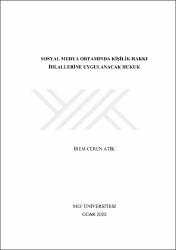Please use this identifier to cite or link to this item:
https://hdl.handle.net/20.500.11779/2240| Title: | Sosyal Medya Ortamında Kişilik Hakkı İhlallerine Uygulanacak Hukuk | Other Titles: | Applicable law in violations of personal rights in social media environment | Authors: | Atik, İrem Ceren | Advisors: | Uyanık, Ayfer | Keywords: | Hukuk Law |
Publisher: | MEF Üniversitesi | Source: | Atik, İrem C., (2023). Sosyal medya ortamında kişilik hakkı ihlallerine uygulanacak hukuk, MEF Üniversitesi, Sosyal Bilimler Enstitüsü, Özel Hukuk Ana Bilim Dalı. ss. 1-160 | Abstract: | Sosyal medya günümüzde en sık kullanılan iletişim alanlarından biridir. Yaygın kullanımına paralel olarak sosyal medya aynı zamanda kişilik hakkı ihlallerinin sıklıkla yaşandığı bir mecra konumundadır. Sosyal medya ortamında işlenen kişilik hakkı ihlalleri günümüzde önemli hukuki uyuşmazlık alanlarındandır. Diğer hukuk dallarında olduğu gibi milletlerarası özel hukuk alanında da bu uyuşmazlıklar inceleme konusu olmaktadır. Zira globalleşen ve teknoloji ile adeta kuşatılan dünyada yabancılık unsurunu havi uyuşmazlıklar giderek artmaktadır. Bu durumda, sosyal medya ortamında meydana gelen ve yabancılık unsuru içeren kişilik hakkı ihlallerine ilişkin uyuşmazlıklarda uyuşmazlığa hangi devletin hukukunun uygulanacağı sorusu gündeme gelmektedir. Bu soruya verilecek cevabın temelinde kişilik hakkı ile ifade hürriyeti arasında yapılan seçim etkili olmaktadır. Cevabı etkileyen bir diğer husus ise gerçek dünya ile siber uzayın ele alınma şeklidir. Milletlerarası özel hukuk bağlamında klasik bağlama kuralları ile sosyal medyada meydana gelen kişilik hakkı ihlallerinin çözümlenip çözümlenemeyeceği, yeni kanunlar ihtilafı kurallarına ihtiyaç olup olmadığı sorusu araştırmamızın temel konusunu oluşturmaktadır. Çalışma üç ana bölümden oluşmaktadır. Çalışmanın birinci bölümünde temel kavramlar incelenmiş olup bu kapsamda internet ve sosyal medya kavramsal olarak ele alınmıştır. Bu bağlamda internet ve sosyal medyanın yapısı, işleyişi, temel aktörleri sırasıyla irdelenmiştir. Ek olarak, internet ve sosyal medyanın yönetimine ilişkin bilgi verilip bu alanda mevcut yasal düzenlemelere yer verilmiştir. İkinci bölümde ise kişilik hakkı kavramı inceleme altına alınmıştır. Öncelikle kişilik hakkı kavramsal olarak açıklanmış, kişilik hakkı ihlallerine değinilmiş ve kişilik hakkı ihlallerine karşı hukuki koruma yöntemleri üzerinde durulmuştur. Son olarak kişilik hakkı ihlalleri internet ve sosyal medya ortamı perspektifinden incelenerek bölüm tamamlanmıştır. Çalışmanın son bölümünde internet ve sosyal medya ortamında meydana gelen kişilik hakkı ihlallerine uygulanacak hukukun tespiti meselesi ele alınmıştır. Bu bağlamda öncelikle, internet ve sosyal medya bağlamında yabancılık unsuru, kişilik hakkı ihlallerinin vasıflandırılması, çeşitli bağlama noktaları ile teorileri incelenmiştir. Son olarak Türk hukuku ve Avrupa Birliğindeki mevcut düzenlemelere ilişkin bilgiler aktarılmıştır. Social media is one of the most frequently used communication platforms today. Parallel to its widespread use, social media is also a common area where you can experience violations of personal rights. Personalality rights violations committed in the social media environment are among the areas of important legal disputes today. As in other branches of law, these disputes are often the subject of discussion in the field of Private International Law. In the globalized world, which is almost surrounded by technology, conflicts including foreing element in is increasing. In this case, the question about international jurisdiction oh the states and which state's law will be applicable to the dispute, regarding the violations of personality rights that occur in the social media environment and that contain a foreign element. The choice between the right to personality and freedom of expression is effective on the basis of the answer to this question. Another aspect that influences the answer is the way the real world and cyberspace are handled. In the context of private international law, the main subject of our research is the question of whether the classical connecting factors and the violations of personality rights in social media can be resolved and whether there is a need for new connecting factors. This dissertation consists of two main parts. In the first part of our study, the basic concepts were examined and in this context, the internet and social media were discussed in detail in the first part. In this context, the structure, functioning and main factors of the internet and social media are examined respectively. Adding to this information on the management concept of the internet and social media is given and the current legal regulations in this field are included. In the second part, the concept of personal rights is examined. First of all, the right to personality is explained conceptually, violations of personal rights are mentioned and legal protection methods against violations of personal rights are emphasized. Finally, the section has been completed by examining the violations of personality rights from the perspective of the internet and social media environment. In the third part of our study, the issue of determining applicable law to the violations of personal rights in the internet and social media environment is discussed. In this context, first of all, the applicable law in the context of internet and social media, the qualification of violations of personality rights, various connecting factors and theories were examined. Finally, information on Turkish law and current regulations in the European Union has been given. |
URI: | https://tez.yok.gov.tr/UlusalTezMerkezi/TezGoster?key=nLNfCsWgUluh5T2iyudShuNmOcDSdd4xcfMUv3BcS4CEB4b8wK2hD66ndDoM6trK https://hdl.handle.net/20.500.11779/2240 |
| Appears in Collections: | SBE - Yüksek Lisans - Tez Koleksiyonu |
Files in This Item:
| File | Description | Size | Format | |
|---|---|---|---|---|
| 827923.pdf | Tez Dosyası | 1.87 MB | Adobe PDF |  View/Open |
CORE Recommender
Page view(s)
26
checked on Jan 13, 2025
Download(s)
232
checked on Jan 13, 2025
Google ScholarTM
Check
Items in GCRIS Repository are protected by copyright, with all rights reserved, unless otherwise indicated.